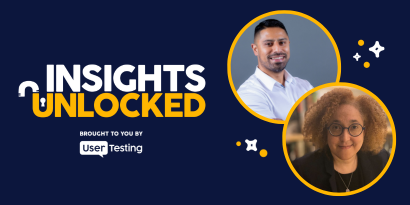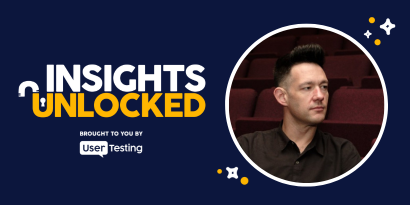
Episode 52 | August 09, 2022
Why UX researchers need to stop hiding from business strategy
Discover how UX research can drive business impact as Alec Levin shares insights on education, strategy, and cross-functional collaboration.
Why UX researchers need to stop hiding from business strategy
Too often, UX researchers operate in silos—masters of user interviews and insights, yet disconnected from the business engine driving their organizations. That disconnect, says Alec Levin, Co-Founder and CEO of Learners, is holding the profession back.
In a recent episode of Insights Unlocked, Alec shared how UX research education must evolve if the field wants to be seen as strategic, not just supportive.
Learning beyond the silo
“Designers go to design conferences, product managers go to product conferences, and researchers go to research conferences,” Alec said. While this sounds logical on the surface, he believes it creates echo chambers that stifle collaboration.
At Learners, a professional community for UX researchers, designers, and product folks, Alec is actively dismantling those silos. By bringing disciplines together through accessible, community-powered education—including free events like UXRConf and programs like Good Research—Learners promotes a more holistic, business-savvy UX practice.
This multidisciplinary approach reflects a broader truth: effective product development is never done in isolation. It’s a team sport, and every player needs to understand the playbook—including the business goals.
ON-DEMAND WEBINAR
Continuous discovery: transform your product development process
UX research education must include business fluency
Alec doesn’t mince words when it comes to the gap between UX research and business strategy. “Researchers don't represent the users—users don’t pay your salary,” he said. “You’ve been hired by a business to help achieve business goals.”
To become a strategic UX researcher, you need more than empathy and qualitative rigor. You need to understand conversion rates, retention metrics, and ROI. Alec argues that an aversion to talking about money and influence has “definitely been to our detriment.”
To move forward, UX professionals must:
- Learn to articulate the value of their work in business terms
- Engage cross-functionally with product and marketing teams
- Shift from simply reporting insights to driving business impact
Building confidence through community
One of the most innovative aspects of Learners is its crowd-sourced, community-driven approach to education. Alec believes UX research education should be shaped by those closest to the work—not just curated by a handful of veterans.
With initiatives like Good Research, participants go deep into key topics like synthesis, quantitative methods, team structure, and storytelling. “Each day had a couple of expert speakers who were really, really good in one of these areas,” Alec noted. “It just worked really, really well.”
And by keeping these events free and accessible online, Learners removes cost barriers that often limit access to high-quality training.
The future of UX research is strategic
If UX wants that elusive “seat at the table,” it must stop speaking only in user journeys and start talking in KPIs and business levers. Alec put it bluntly: “It’s impossible to be a strategic researcher unless you understand the economics of the business.”
The path forward is clear: expand your toolkit, break out of your discipline’s echo chamber, and speak the language of the business. Only then can UX research fully unlock its potential to drive innovation and impact.
As Alec summarized, “Our goal is to deliver the learnings that are going to make people better at what they do.”
Episode links:
- Democratize and scale UX research: This 90-minute session explores how empowering your entire organization to gather, analyze, and act on user insights can make UX research more strategic and respected. It offers real-world examples and practical tips on democratizing feedback and scaling research efforts
- The UX research methodology guidebook: This comprehensive guide covers various UX research methods, including remote and in-person studies. It provides insights into when and how to use different research techniques throughout the product development lifecycle, emphasizing the importance of aligning research with business goals.
- Calculating and communicating the ROI of UX research in your organization: In this Insights Unlocked episode, Dave Kerry discusses the importance of understanding and articulating the return on investment (ROI) of UX research. The conversation delves into strategies for quantifying UX research benefits and aligning them with business objectives
- The ins and outs of building a user research education program: This blog post outlines the steps to create an effective user research education program within your organization. It emphasizes the value of spreading knowledge about collecting customer insights to promote a more customer-centric culture.









